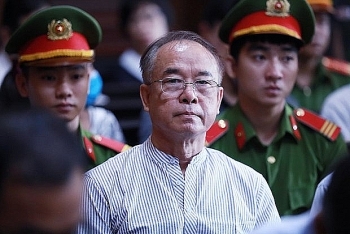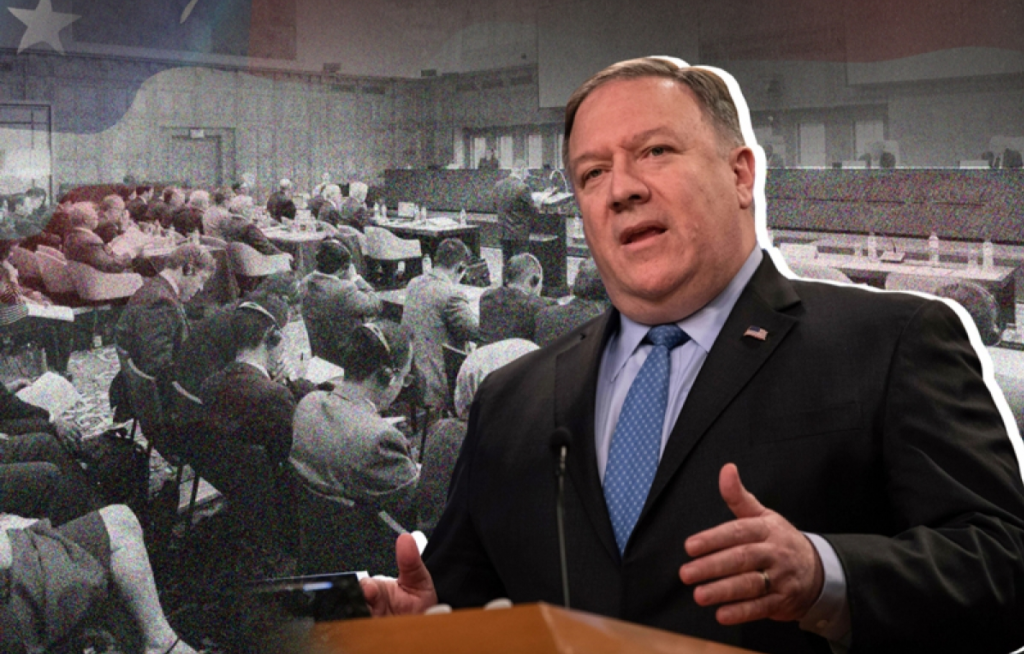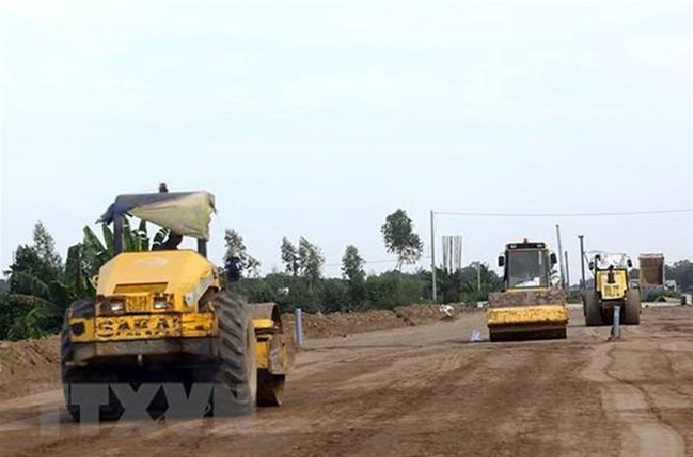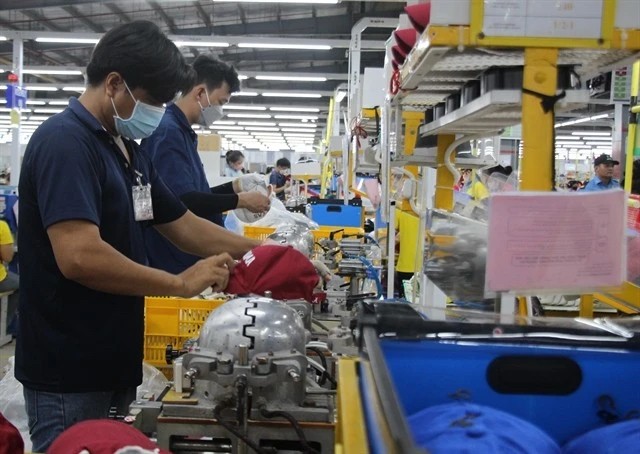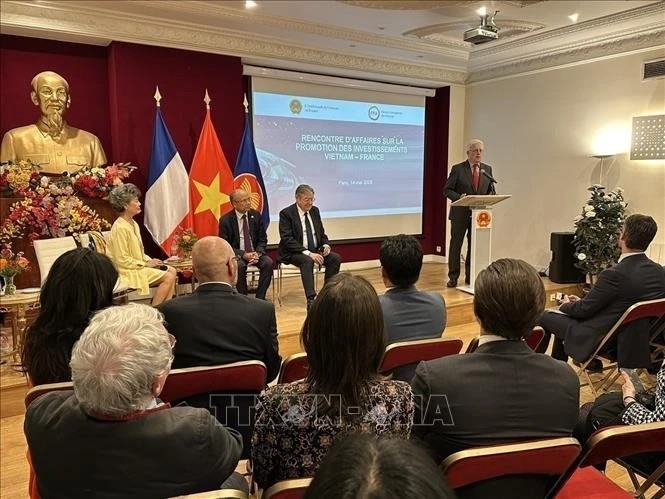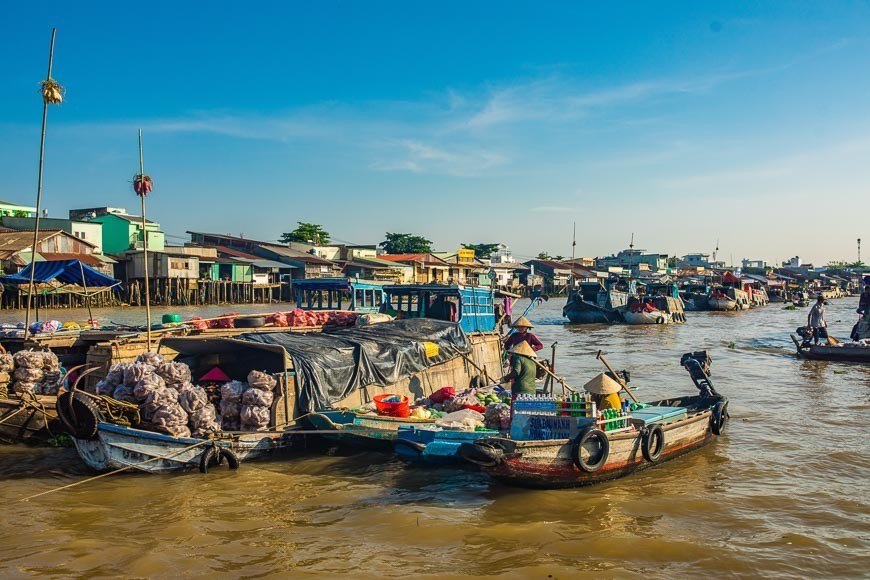New Vietnam Investment Law 2020: some new key points
On 17 June 2020, the new Law on Investment was passed by the National Assembly of Vietnam. This will take effect on 1 January 2021 (LOI 2020) and replace the current Investment Law 2014 (LOI 2014).
The government has also released the draft decree guiding the implementation of the New Investment Law (“Draft Decree”), which is expected to be effective from 1 January 2021 and replace Decree 118/2015/ND-CP (“Decree 118”), lexology reported.
Market entry conditions and a potential “negative list” for foreign investors
For the first time, the LOI 2020 distinguishes between (1) market entry conditions that apply to foreign investors or Deemed Foreign Investors (defined below), and (2) investment conditions that apply to all investors. Regarding market entry conditions, under the LOI 2020, foreign investors are entitled to the same market entry conditions as applicable to domestic investors except for the areas subject to market entry conditions and are to be published by the Government (Market Entry List).
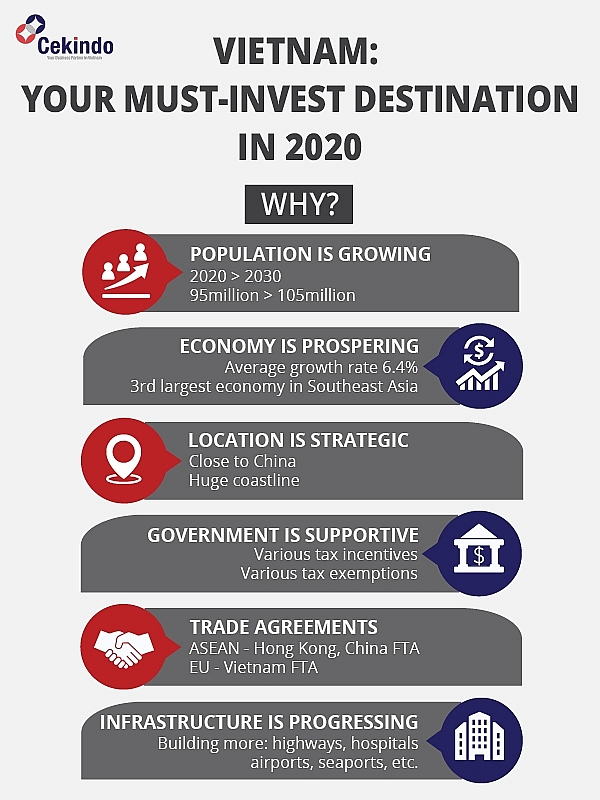 |
| Photo: Cekindo |
This “negative list” approach is one of the applaudable changes in the LOI 2020 and is similar to the approach that Vietnam adopts when it signed the CPTPP in 2018. The catch, however, is when and how the Government will publish the negative list promised under the LOI 2020.
According to vnlaw, the new approach, if implemented correctly, could save time for both foreign investors and licensing authorities in determining and appraising investment proposals and applications for registration of merger and acquisition activities (M&A Approvals). That said, it is not easy for the Government to review all treaties, laws, and regulations to produce an exhaustive and complicated Market Entry Lists applicable to foreign investors from all jurisdictions who may have different treatment levels under relevant bilateral treaties and/or multilateral treaties.
Recently, the Ministry of Planning and Investment (MPI) has published a consolidated list of investment conditions applicable to foreign investors in Vietnam. If the Market Entry List is similar to the list published by the MPI, then it could be difficult to determine what belongs to the Market Entry List and what does not.
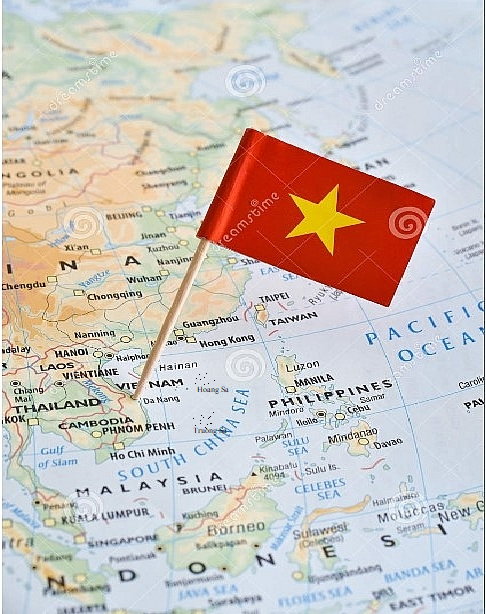 |
| Photo: dreamstime |
Moreover, there is no deadline for the Government to issue the Market Entry List. Until the Government produces a clear Market Entry List, the licensing authorities would still keep their practice of seeking opinions of relevant authorities if foreign investors propose investments in business lines that are not clearly opened to foreign investors under the WTO Commitments on Services of Vietnam. In practice, the application of bilateral treaties and multilateral treaties like CPTPP is not straight-forward procedures.
New encouraged business sectors and projects with special investment incentives and support
The LOI 2020 includes the following new business sectors and projects, which are encouraged for investment or are entitled to investment incentives:
(i) college education;
(ii) manufacture of medical equipment and all pharmaceutical products (previously the LOI 2014 only encouraged investment in certain pharmaceutical products);
(iii) manufacture of products in supporting industries on the list of industries eligible for development promotion provided in Government Decree 111 dated November 3, 2015;
(iv) manufacture of products and provision of services that create or participate in the value chain or associated industries;
(v) social housing projects;
(vi) innovative start-up projects;
(vii) research and development centers;
(viii) small- or medium-sized business incubators; and
(ix) co-working space for small- or medium-sized businesses.
Under the LOI 2020, the Government can decide to apply special incentives and investment support to encourage projects that have material impacts on the socio-economic development falling within the following types:
(i) investment projects of establishing innovative centers, research and development centers with the total investment capital of VND 3,000 billion or more and disbursing at least VND 1,000 billion within three years since the issuance date of relevant investment registration certificate (IRC) or in-principle approval;
(ii) investment project of establishing the national innovative center under a decision of the Prime Minister; and
(iii) investment projects in the especially encouraged sectors that have the total investment capital of VND 30,000 billion or more, and disburse at least VND 10,000 billion within three years since the issuance date of relevant IRC or in-principle approval.
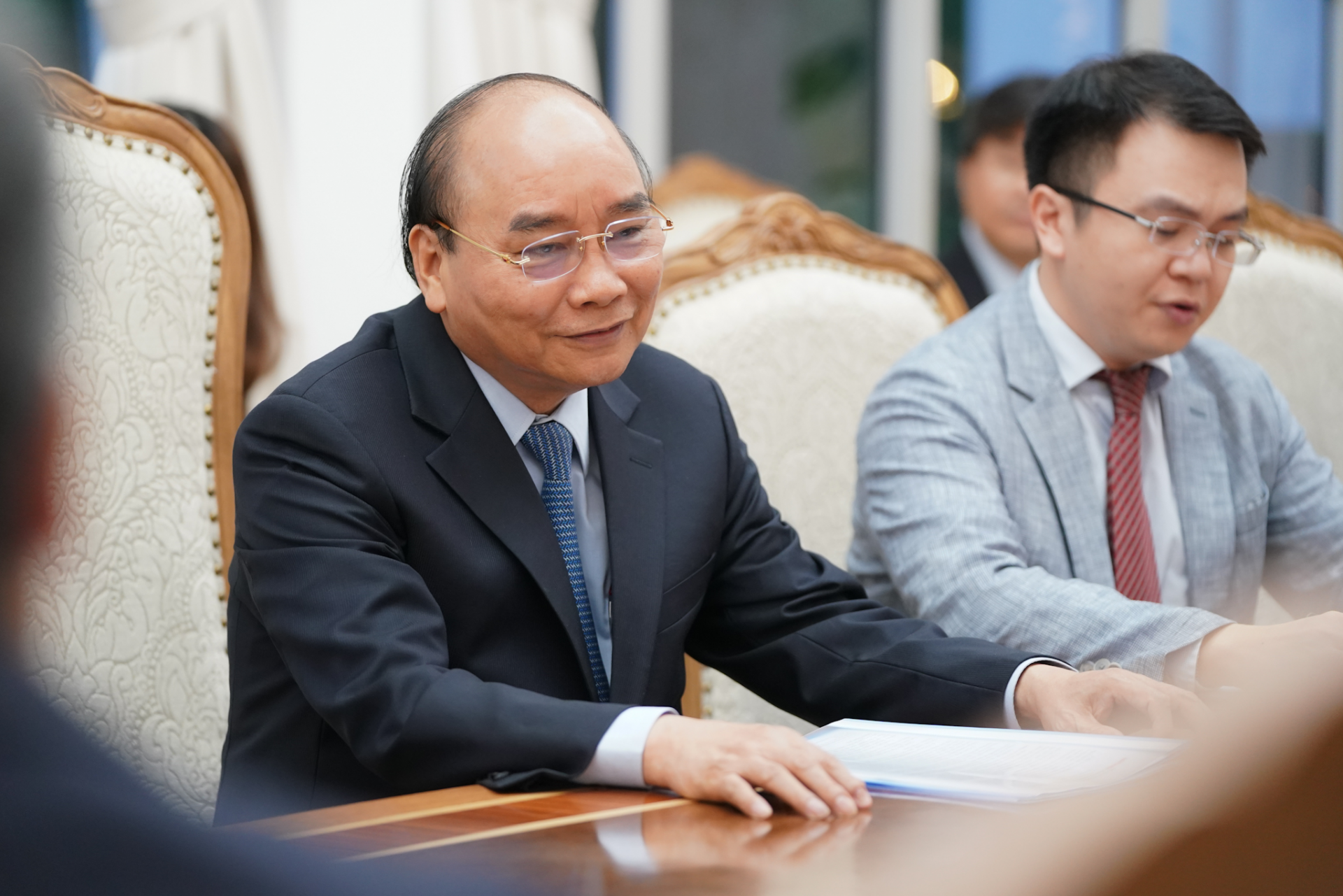 |
| Prime Minister Nguyen Xuan Phuc affirmed: “The Vietnamese government always creates favorable conditions for foreign investors and large enterprises, especially the EU, enterprises with high technology and capability to do business. investment in Vietnam. |
That said, the LOI 2020 expressly excludes the following cases from the application of special incentives and investment support:
(i) mining projects;
(ii) manufacturing or trading of goods/services liable to excise tax (except manufacturing of car, plane, or boat);
(iii) commercial housing projects; and
(iv) projects having IRCs or in-principle approvals issued before January 1, 2020.
Fifty percent (instead of 51 percent) foreign ownership for deemed foreign investors
A Vietnamese economic organization must satisfy the investment conditions and comply with investment procedures applicable to a foreign investor (a Deemed Foreign Investor) when participating in the incorporation of another Vietnamese economic organization, acquiring an ownership interest in an existing Vietnamese economic organization, or investing in form of business cooperation contract if more than 50 percent of charter capital of the first-mentioned Vietnamese economic organization is held by:
(i) foreign investors (in that case, the Vietnamese economic organization is considered as a 50 percent top-level foreign invested enterprise (FIE)); or
(ii) fifty percent Top-level FIEs; or
(iii) foreign investors and 50 percent top-level FIEs.
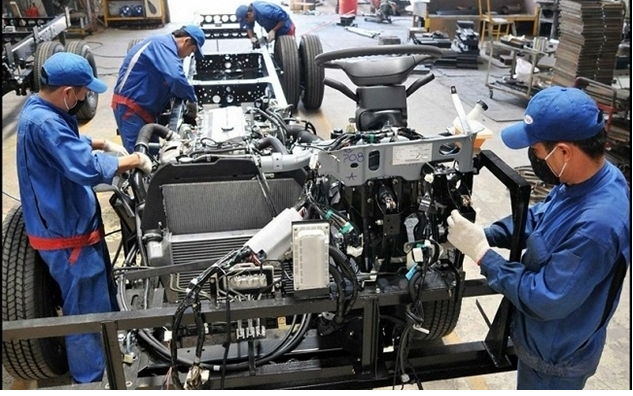 |
| Manufacturing is the most attractive industry to foreign investors in the first four months of 2020. |
The foreign ownership threshold in a Deemed Foreign Investor is reduced from 51 percent under LOI 2014 to more than 50 percent of the charter capital. Therefore, for a Deemed Foreign Investor, where foreign investors hold controlling shares (more than 50 percent) but less than 51 percent under the LOI 2014, the following issues need to be further clarified:
- Whether the existing investments of a Deemed Foreign Investor under the LOI 2020 could continue to be regarded as an investment by Vietnamese investors (as it is under the LOI 2014) or must satisfy the conditions applicable to a foreign investor given the change of status of the Vietnamese economic organization from a local investor into the Deemed Foreign Investors under the LOI 2020; and
- In the latter case, it is not clear what procedures the Deemed Foreign Investors must comply with.
National Security and Defense Conditions
Under the LOI 2020, an investor’s investment project and business activities will be suspended or terminated if such activities cause damage, or could cause damage to national defense or national security. It is not clear if an investor has no fault in causing damage to national defense or national security, then whether the investor could be compensated for forced suspension or termination of their lawful investment and business activities.
This is a valid question for many investors given the territorial dispute between Vietnam and China in the East Sea. The Petroleum Law provides that if petroleum operations are restricted for reasons of national defense or national security, then the Government of Vietnam will compensate for any damage to investors resulting from such restriction.
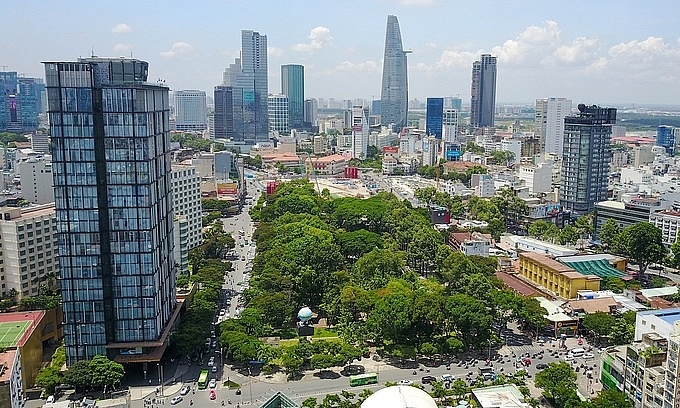 |
| Foreign investors, mainly from Japan, South Korea and Singapore, are interested in HCMC's property market. Photo by VnExpress/Quynh Tran. |
Moreover, in addition to the market entry conditions, the following conditions must be satisfied by a foreign investor or a Deemed Foreign Investor if they want to purchase/subscribe shares or equity capital in a Vietnamese economic organization (Acquisition):
(i) ensuring the national defense and security in accordance with the LOI 2020; and
(ii) satisfying the land law’s provisions on conditions to receive land use rights of land lots located in islands, border areas or coastal areas.
In addition, an acquisition of a Vietnamese economic organization, which holds land use rights in a border area or coastal area will be subject to an M&A Approval. These national security and defense conditions could apply to existing Vietnamese companies, which already have foreign investors when these Vietnamese companies raise capital from existing shareholders.
According to Vietnam Law Magazine, the satisfaction of these conditions would need to be considered by licensing authorities when foreign investors apply for an M&A Approval in either compulsory application or voluntary application. There is no clear criteria about national security and defense. Therefore, in many (if not all) cases, the licensing authority may need to seek opinions from the Ministry of National Defense, the Ministry of Public Security and/or the Ministry of Foreign Affairs. This could substantially delay the investment process.
In addition, it is not clear how a foreign investor, who plans to acquire shares in a Vietnamese economic organization, which is not subject to compulsory M&A Approval, could determine whether the conditions on national defense and security are satisfied. Therefore, a prudent foreign investor may voluntarily apply for an M&A Approval to ensure that its investment does not raise any national defense or security concerns.
Clearer guidance on M&A Approval
The table below summarizes the cases where an M&A Approval is required for an acquisition under the LOI 2020:
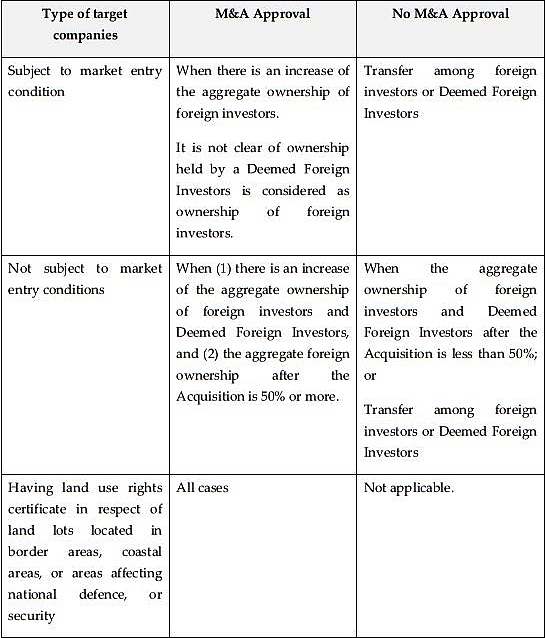 |
| Photo: vnlaw |
The wording of Article 26.1 of the LOI 2020 suggests that a transfer of shares/capital among foreign investors or Deemed Foreign Investors, which results in no “increase” in the aggregate foreign ownership in a target company should not be subject to an M&A Approval. If it is the case in practice, it would save time and cost for foreign investors in many deals of transfer of shares among foreign investors.
Under the LOI 2020, foreign investors that are not subject to the compulsory M&A Approval can voluntarily apply for an M&A Approval which is not a new point of the LOI 2020. However, as discussed above, to address the concern about national defense and security conditions, a foreign investor may still voluntarily apply for an M&A Approval.
Potentially less government support for large projects
Regarding large infrastructure projects, the LOI 2020 no longer contains provisions about the ability of the Government to give performance guarantee regarding obligations of State-owned enterprises or to give guarantee about foreign exchange availability.
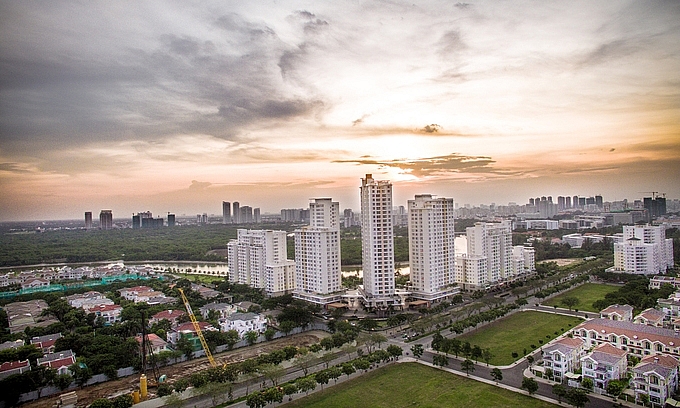 |
| A residential suburb in the southern part of Ho Chi Minh City. Photo by VnExpress/Lucas Nguyen |
Projects implemented under the 2020 Public-Private Partnership Law (PPP Law 2020) could enjoy limited foreign exchange availability guarantee under such law. Projects implemented under the LOI 2020 will have to rely on the potential “State assurance” under Article 11 of the LOI 2020, or the special investment supports under Article 18 of the LOI 2020 which in theory could cover all the guarantees and supports provided under the PPP Law 2020. However, logically, a non-PPP project under the LOI 2020 should enjoy less government support and guarantee than a PPP project under the PPP Law.
Termination of investment projects based on a sham transaction
The LOI 2020 officially allows Vietnamese authorities to terminate an investment project if the investors conduct investment activities based on sham transactions under the Civil Code 2015.
Under the Civil Code 2015, a sham transaction is understood as a transaction established by the parties to conceal another underlying transaction. A nominee arrangement, where the nominee conducts investment activities for the benefits of another person could be regarded as a sham transaction. The Civil Code 2015 provides that the court has the jurisdiction to declare whether a transaction is a sham transaction and invalidate such transaction. It is not clear whether under the LOI 2020 an investment licensing authority can determine whether an investment project is implemented under a sham transaction, and terminate such investment project or such authority should wait for a valid court’s ruling on the same issue.
Selection of investors
The LOI 2020 provides for the selection of investors for a project in case of auction of land use rights in accordance with the land law, bidding to select investors in accordance bidding regulations, and issuing in-principle approvals without being subject to cases. The procedures for investor selection under LOI 2020 are clearer but more complicated than those under Decree 118 of 2015, on implementing the LOI 2014.
Under Decree 118 of 2015, an investor that wins the auction of land use rights or the bid for a land-using investment project is not required to carry out the procedures to obtain an in-principle approval of investment. However, it is not clear under the LOI 2014 and Decree 118 of 2015 how the relevant investment proposal has been prepared and appraised before the auction or the bid is held.
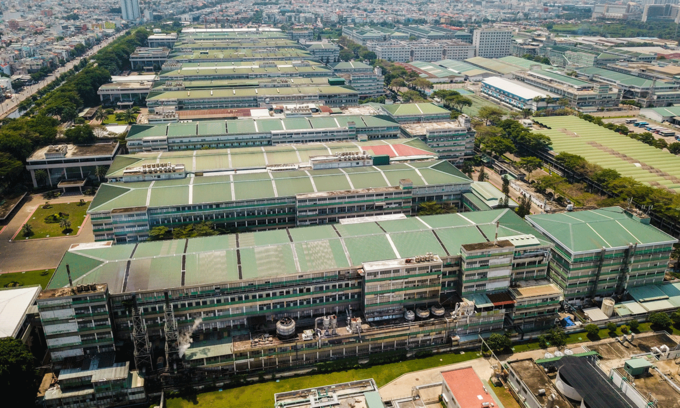 |
| An aerial view of factories of Taiwanese shoemaker Pouyuen Vietnam in Ho Chi Minh City, July 9, 2020. Photo by VnExpress/Quynh Tran. |
The LOI 2020 clarifies the unclear issues of the LOI 2014 and Decree 118 of 2015 by providing that:
(i) the selection of an investor through the auction of land use rights or the bid for an investment project will be carried out after an in-principle approval is obtained (except for cases not subject to in-principle approval); and
(ii) a competent authority is entitled to propose an investment project and obtain an in-principle approval which is also a new point of the LOI 2020 (Article 33.2).
More carve-outs for 24-month limit of project implementation schedule extension
The LOI 2020 has removed the provision regarding extension of project implementation schedule under the LOI 2014. Instead, the LOI 2020 allows an investor to change the project implementation schedule of an investment project having an in-principle approval by no more than 24 months except for the following cases (where extension of more than 24 months is permitted):
(i) the State’s delay in delivery of land;
(ii) at the request of state authorities;
(iii) state authorities’ delay in completing administrative procedures;
(iv) change of master plan by state authorities;
(v) change of objectives stated in the in-principle approval;
(vi) addition of objectives subject to an in-principle approval; and
(vii) increase of total investment capital by at least 20 percent which results in a change of the project scale.
The LOI 2014 allows an investor to apply to change the project implementation schedule without any specific time limit. However, in practice, many licensing authorities do not allow any extension of more than 24 months except in case of a force majeure event.
Other notable changes
No extension of term for unwanted projects
The LOI 2020 makes clear that the following investment projects may not extend their terms of operation:
(i) investment projects using outdated technologies, potentially causing environmental pollution, or being resource-intensive; and
(ii) investment projects in the cases where the investors are required to transfer without compensation of assets to the Vietnamese State or Vietnamese parties.
No requirement of investment procedures applicable to foreign-invested startups
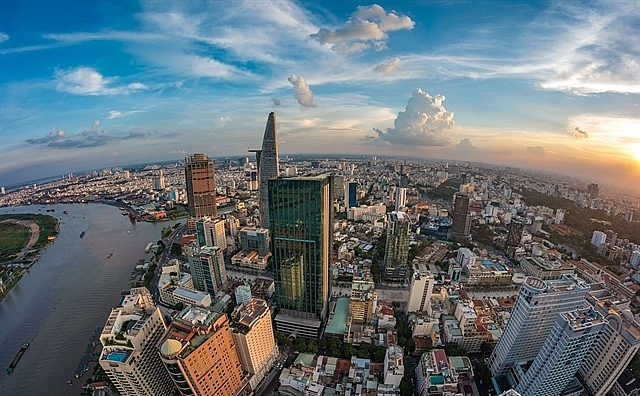 |
| Việt Nam's real estate market continues to attract foreign investors because of its growth potential. photo tbck.vn |
A foreign investor that incorporates a small- or medium-sized innovative startup enterprise or an innovative startup investment fund is neither required to have an investment project nor obtain an investment registration certificate. The procedures to be certified as a small- or medium-sized innovative startup enterprise or an innovative startup investment fund are provided in the 2017 Law on Assistance for Small and Medium-Sized Enterprises. Although this exception could save some time for the foreign investor at the beginning, it may raise additional operational issues later on (e.g., difficulty in opening a “DICA” account with local banks).
Some clarifying points on investment procedures
The LOI 2020 clarifies certain ambiguity and inconsistencies regarding the procedures to implement an investment project:
(i) there is no need to have an environmental impact assessment report (EIAR) before applying for an IRC. This clarifies the inconsistency between Decree 40 of 2019 (which is similar to LOI 2020), and the 2014 Law on Environment Protection (which requires an EIAR before issuance of the IRC); and
(ii) a prefeasibility study report under the construction law can replace an investment proposal under the LOI 2020.
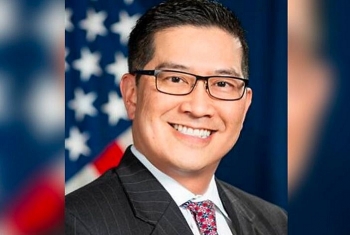 | Vietnamese American lawyer tapped to lead the US Immigration and Customs Enforcement Tony Pham, a Vietnamese American prosecutor and jail supervisor, becomes the leader of U.S Immigration and Customs Enforcement (ICE) from 23 August. |
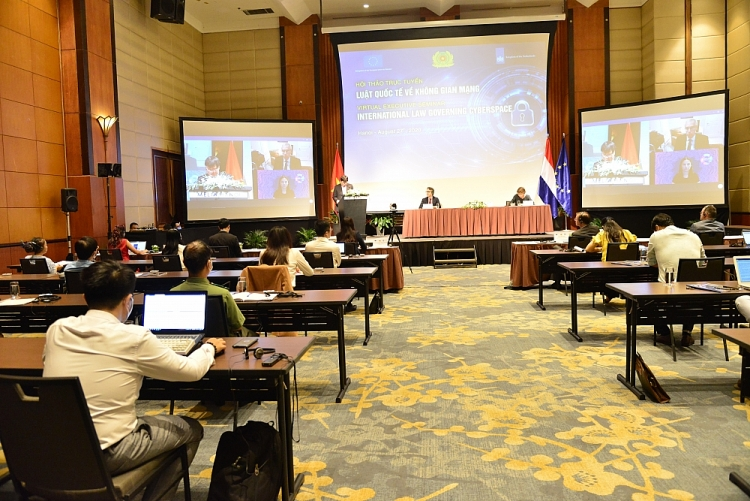 | International Law in Cyberspace: The foundation to ensure human rights and national interests In order to implement the cooperative commitment between Vietnam and the Netherlands on strengthening cooperation in the field of cybersecurity, Vietnam Ministry of Public Security's ... |
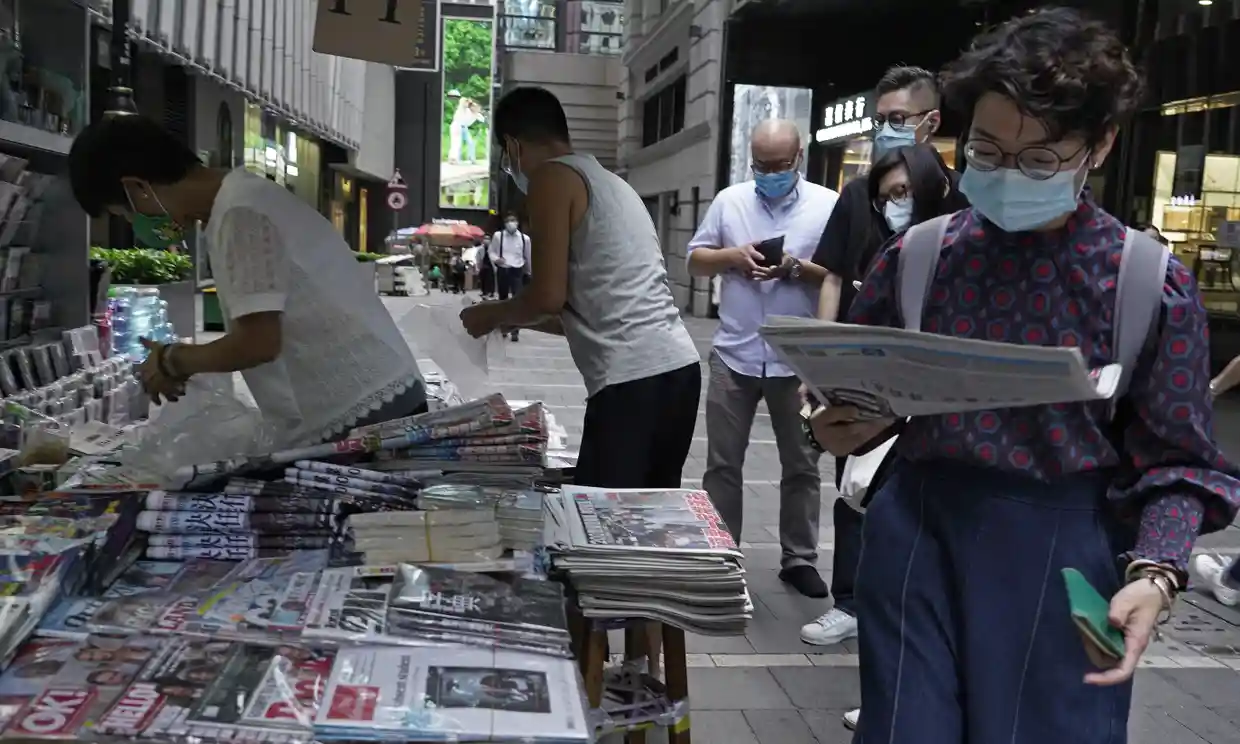 | Hong Kong denies a foreign journalist visa amidst natinal security law concerns Hong Kong has rejected Irish journalist Aaron McNicholas’s visa on Thursday amid fear of a clampdown on a press freedom |

